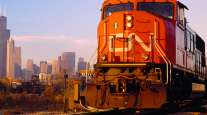Senior Reporter
CN Reports Mixed Q1 as It Enters Merger Battle Over KCS

[Stay on top of transportation news: Get TTNews in your inbox.]
Canadian National on April 26 reported a slight decline in income and revenue for the first quarter, but company executives during a conference call with investors spent as much time discussing the railroad’s move to seize ownership of Kansas City Southern as they did discussing their own railway’s financial results.
Canadian National for Q1 reported net income of C$974 million or $C$1.37 a share, compared with C$1.01 billion, C$1.42, a year ago. The Montreal-based railroad reported quarterly revenue of C$3.53 billion, slightly lower than 2020’s C$3.54 billion.
Despite a difficult weather month in February across much of the CN rail network, the company’s operating ratio improved to 62.5 from 65.7 last year. Operating ratio, or operating expenses as a percentage of revenue, is used to measure efficiency. The lower the ratio, the higher the company’s ability to generate profit.
CN First Quarter Results Demonstrate Continued Economic Recovery
Read more here: https://t.co/n3VTpE0Rw7 pic.twitter.com/UzsAO30A4P — Canadian National (@CNRailway) April 26, 2021
“We experienced a couple of weeks of February [with] extreme cold temperatures — with temperatures dipping below minus 40 degrees on large parts of our network,” Chief Operating Officer Rob Reilly said. “During this time, we were able to deploy our air car fleet, which allowed us to use multiple air sources during this challenging time. This helped us move 5% more volume during the quarter while holding crew starts flat.”
The company’s “air car” fleet is composed of 45 air repeater cars, or modified boxcars equipped to supply air to the train’s braking system. The cars are deployed in some of Canada’s coldest areas during winter, which the company said helps improve service and reliability by enabling CN to maintain longer train lengths. The railway during 2018-19 spent more than $400 million to add new infrastructure and boost capacity.
The company is now trying to expand its footprint through a proposed $33.7 billion acquisition of KCS, which has routes in the Midwest U.S. as well as hundreds of miles of track that extend into northeastern and central Mexico. In March, Canadian Pacific announced plans to acquire KCS for $28 billion, which includes paying off $3 billion in the smaller railroad’s debt. Canadian National made its competing offer on April 20, and believes its offer is superior to the rival bidder’s.

Ruest
“We are confident that together with KCS’ experienced and very talented team, we will be able to continue that success in a combination of CN and KCS to the benefit of both companies,” CEO JJ Ruest said. “Specifically, this offer will deliver a superior value to KCS shareholders. CN’s proposal represents a 21% premium to the CP proposal, and more than double the amount of cash per share, resulting in not just greater value, but also greater certainty of the value for KCS shareholders.”
Regardless of which railway seals a deal, completing an acquisition could take some time. Economist Paul Bingham with IHS Markit noted that any deal will require regulatory approval from the Surface Transportation Board in Washington, D.C., Canada’s Transport Ministry and Mexico’s Secretariat of Communications and Transportation.
Canadian National saw mixed Q1 revenue across its various business lines compared with 2020.
Petroleum and chemical products declined 16% to C$661 million from C$791 million, while metals and minerals dipped 9% to C$368 million from C$405 million. Forest products showed a 1% decline to C$429 million from C$433 million, while coal shipments fell by 9% to C$126 million from C$143 million. Grain and fertilizer revenue increased by 17% to C$713 million from C$610 million.
Intermodal revenue grew by 14% to C$968 million from C$849 million, while automotive revenue fell by 14% to C$158 million from C$193 million a year ago.
“We are confident in our ability to continue delivering strong results as the economy rebounds,” Reilly said. “Our network is fluid and we’ve recovered well from the extreme temps in February. We look forward to realizing the pipeline of growth opportunities in front of us.”
CN is one of several Class I railroads that adopted precision scheduled railroading to improve its efficiency. With PSR, longer trains are managed and operated by fewer employees. Even with higher Q1 fuel prices in the first quarter, CN said fuel efficiency improved by 4% and overall train length increased 3% to 9,421 feet compared with 9,134 feet last year. CN said labor costs increased C$42 million, or 6% because of higher incentive compensation.
Want more news? Listen to today's daily briefing below or go here for more info:





